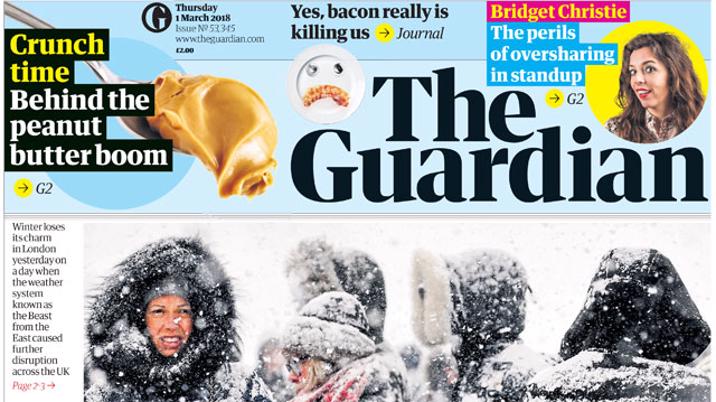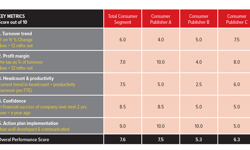
Tectonic plates
2018 is already turning out to be the year of the mega deal. First up, in the B2B space, the already very large Informa gobbled up the very sizable UBM to create a new £9bn B2B publishing and events business. On the news, UBM shares went up, Informa’s went down, but what do markets know. For Informa’s Chief Executive Stephen A Carter, the logic was self-evident: “It is clear that the B2B Market is moving to Operating Scale and Industry Specialisation. The Combined Group will have the reach and market capabilities to take full advantage of these trends.” That being said, one has to wonder just how much more scale a company needs. Before the deal, Informa was valued at £6bn, hardly a minnow. What kind of business opportunities are beyond the reach of a £6bn company?
Secondly, in the world of news media, the long-mooted tie-up between Trinity Mirror and the publishers of the Daily Express (Richard Desmond’s Northern & Shell group) finally came to pass. Trinity Mirror acquired Northern & Shell’s publishing assets for a total purchase price of £126.7 million. Simon Fox, chief executive, Trinity Mirror plc, who presumably has seen the ABC certificates for N&S’s titles, said: “This deal is a really exciting moment in Trinity Mirror’s history, combining some of the most iconic titles in the UK media industry. It is good for our readers, good for our customers and good for our shareholders. Northern and Shell’s titles have a large and loyal readership, a growing digital presence and a stable revenue mix and offer an excellent fit with Trinity Mirror.”
And, last of the mega deals, consumer media giant Time Inc UK was snapped up by private equity company Epiris. The purchase price was not disclosed but was rumoured to be in the region of £130m, a figure that is pretty meaningless until put in context: in 1998 when Cinven bought IPC Media (as the publisher was then known), the purchase price was £860m, and when Cinven then sold the company to Time Warner in 2001, it was for £1,150m. The recent history of consumer media in numbers.
Other M&A activity
The above deals somewhat sucked the air out of the room, but were by no means the only M&A activity in the period: Euromoney announced that it was to sell its Global Markets Intelligence Division for an equity value of $180.5 million. As Andrew Rashbass, CEO of Euromoney, explained: “This transaction is another example of Euromoney’s strategy in action: where a good business is not strategic, we will sell it and recycle capital towards our main investment themes like price discovery, asset management and telecoms.”
Elsewhere in the financial information sector, Centaur Media sold Corporate Adviser to its management team headed by John Greenwood. The sale will allow Centaur’s Financial Services portfolio to focus on fewer, larger brands moving forward which, says Centaur, is all part of the strategic plan. Fewer brands, bigger scale, deeper coverage would appear to be the future of media.
Newsquest continued to hoover up the UK regional press, this time CN Group, publishers of a stable of titles in the north of England, including the News & Star. Robin Burgess, chairman of CN Group, said: “A member of my family has run this company for the past four generations so this sale is the end of an era and is tinged with sadness.” Miller Hogg, CEO, said: “It is vitally important for a local media company like CN to be part of a larger and committed regional media group like Newsquest.”
So frequent and routine are the Newsquest acquisitions becoming, that virtually the same media statements are being rolled out each time. The template: “We look forward to the opportunity of working with the [CN Group / Isle of Wight County Press / NWN Media], its staff and the community it represents in building on their great local brands and publishing expertise, and helping them forge a strong future. We will endeavour to support them with the scale and resources that Newsquest can provide, whilst enabling them to carry on what they have done so well for many years – namely providing first class content and advertising solutions for the people and businesses of [Cumbria / Isle of Wight / North Wales] and the wider region.”
There was recently a rumour in The Guardian that Newsquest was in talks with Archant. The story was quickly denied by all concerned, but I have a sneaking suspicion that we’ll be seeing that template again very soon.
Last, on the M&A front, KHL, the Sussex-based construction information publisher, acquired the USA-based publisher Diesel & Gas Turbine Publication Group. As James King said, “This acquisition continues to transform KHL towards its long-term vision of becoming a full-line information, data, events, research, consultancy and communications company.”
What’s in a name
Hot off the back of acquiring the Express titles, Trinity Mirror announced its intention (subject to shareholder approval) to change its name to Reach plc. Simon Fox, chief executive officer, said, “Through our content we reach millions of people every day. Our reach extends across multiple platforms in both Print and Digital and across the cities and communities that we serve. We think this is a name which better reflects what we do and what our ambitions are.”
Described by someone as a ‘Ronseal’ approach (although as far as I know, Ronseal never called themselves just ‘Paint’), I do wonder about ‘Reach plc’ – for a start, why pick the one measure in which you’re guaranteed always to lose out to Facebook? It needs qualifying – Targeted Reach plc perhaps? Still a bit colourless and generic…
Events
There was further evidence this period that ‘events’ is where publishing is at, with Hearst leading the way. They recently announced the launch of Esquire Self-Made (a one-day summit aimed at inspiring the next generation of entrepreneurs, taking place on 28th April at London’s Glaziers Hall) and Elle Weekender (a three-day “immersive” event taking place at the Saatchi Gallery in November). On top of that, Hearst also acquired from Telegraph Events, Be:FIT, a fitness and wellbeing festival for women and Salon QP, a luxury watch fair. Hearst Live now puts on over 100 events a year and the team has recently expanded by a third.
As Victoria Archbold, MD Events & Sponsorship at Hearst Live, told Campaign in the autumn: "We are reacting to market trends and we know that our readers want to get involved with brands and they don’t want to be interrupted. They want that involvement with brands, they want to be able to look, touch, feel and create their own content from brands, so we reacted to that trend and set up Hearst Live, which is obviously part of our revenue diversification strategy that James [Wildman, chief executive] has made no secret that he’s doing.”
NME
Early March saw a slightly misplaced outpouring of grief at the closure of NME’s weekly print edition. End of an era and all that and an excuse to wallow in the demise of a once great title and the travails of the industry as a whole. The 60+ year old brand had been haemorrhaging print circulation for years. From its high-water mark of 306k in 1964, the circulation had shrivelled to 16k in 2015. At this point, Time Inc converted it to a free title, upped its print run to 300k and started handing it out, outside tube stations et al. This gave the print edition a couple more years’ grace but a niche title was always going to struggle with a mass market model, especially given the downward pressures on advertising. It was already clear in 2015 that its future was digital, and the recent shuttering of the weekly edition simply confirmed that. The publishers point to 3m monthly UK uniques, not a figure to be sniffed at, and new audio services and an enhanced ticketing and membership offer. It might not have the edgy presence of its 60s and 70s self, but that’s still a solid base for future growth.
New look for The Guardian
The Guardian newspaper changed shape in January, a move that would have had the whole industry buzzing had it taken place a decade earlier, but which now passed off with barely a murmur. Its switch from broadsheet to ‘Berliner’ in 2005, following The Times and Independent’s switch to tabloid, was seen as a big deal, part of a strategic repositioning of the quality press. By giving readers the ability to fold their paper in a crowded train, without elbowing fellow passengers in the face, publishers felt they were securing their long-term future… But that was then, when The Guardian sold 350,000 copies a day and this is now, when it sells 150,000. Cost cutting is now de rigueur. Tabloid is cheaper to print and outsourcing makes it cheaper still. Putting a brave face on it, Editor-in-Chief Katharine Viner: “We know that it is our award-winning, quality, independent journalism that our readers value most, rather than the shape or the size of the newspapers.” True, but of course the Guardian is still giving all its content away for free online. Which reminds me, I must make a donation.
Talking of new looks, Glamour’s digital-first evolution continues with the publication of the first of its now biannual print editions, the Spring / Summer 2018 issue (SS18). Air brushing away the previous seventeen years’ worth of monthly issues, this is Volume 1. At over 200 pages and packed with glossy advertising, it’s probably heavily subsidising the title’s present and future digital aspirations. In her ‘editor’s’ letter, Chief Content Officer Deborah Joseph urges readers to get involved: “We’re here all day, every day. Come and visit us on Facebook, YouTube, Instagram and Twitter, tag us … and… let’s keep the conversation going…”. We wish Glamour well, not least in overcoming such legacy irritations as the fact that its website URL, and Twitter and Facebook names, all still have the word ‘magazine’ in it.
And finally, Leveson2 is being spiked, Section 40 taken off the statute books, and, given Impress’s recent travails, it looks like it’s back to business as usual for the press. Plus ça change. Was it all worth it? By shining a spotlight on unethical practices and dodgy dealings, it undoubtedly forced those newspapers that needed to, to clean up their acts, but given that so many of the activities uncovered were criminal, one wonders why they couldn’t all have been properly addressed through the criminal justice system. Maybe that’s worth an investigation.












